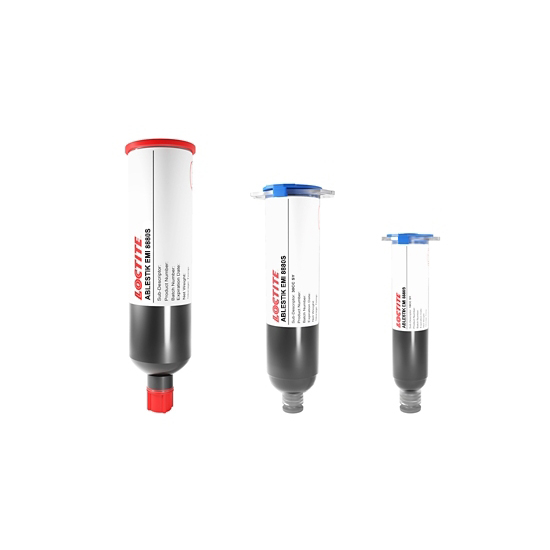LOCTITE ABLESTIK EMI 8880S
- Conformal EMI shielding
- Excellent adhesion on EMC
- Spray coating
Product Description
Unfortunately market demand for this material has decreased to the point that we are no longer able to support sufficient production of the product. Therefore, as of August 21, 2025 this product will be discontinued. The last date to place orders for this product is December 31st 2024. But fret not. EMI 8890SB is a similar and slightly improved version that can work as a drop in alternative for applications that are already using EMI8880S.
LOCTITE ABLESTIK EMI 8880S is an electrically conductive adhesive designed to achieve robust electromagnetic interference (EMI) shielding performance with extremely thin coating thickness at a single micrometer level for package level shielding applications.
LOCTITE ABLESTIK EMI 8880S has robust adhesion to mold compound, epoxy, copper, gold and silver surfaces. When spray-coated, this material can be atomized to highly fine droplets for excellent uniformity at low to high coating thicknesses which can be controlled by equipment parameters. It is typically used for RF and wireless components, memories, sensors and other sensitive devices.
Cure Schedule
- 60 minutes @ 175°C
Technical Specifications
| General Properties | |||||||||
| Work life @25°C Work life @25°C Work life is the amount of time we have to work with a material until it is no longer able to be easily worked and applied on a substrate. It is based on the change in viscosity and it can rely on the application requirements. | 24 hours | ||||||||
| Physical Properties | |||||||||
| Thixotropic index Thixotropic index Thixotropic Index is a ratio of a material s viscosity at two different speeds in Ambient temperature, generally different by a factor of ten. A thixotropic material s viscosity will decrease as agitation or pressure is increased. It indicates the capability of a material to hold its shape. Mayonnaise is a great example of this. It holds its shape very well, but when a shear stress is applied, the material easily spreads. It helps in choosing a material in accordance to the application, dispense method and viscosity of a material. | 2.7 | ||||||||
| Viscosity Viscosity Viscosity is a measurement of a fluid’s resistance to flow. Viscosity is commonly measured in centiPoise (cP). One cP is defined as the viscosity of water and all other viscosities are derived from this base. MPa is another common unit with a 1:1 conversion to cP. A product like honey would have a much higher viscosity -around 10,000 cPs- compared to water. As a result, honey would flow much slower out of a tipped glass than water would. The viscosity of a material can be decreased with an increase in temperature in order to better suit an application | 530 mPa.s | ||||||||
| Chemical Properties | |||||||||
| |||||||||
| Electrical Properties | |||||||||
| Volume Resistivity Volume Resistivity Volume resistivity, also called volume resistance, bulk resistance or bulk resistivity is a thickness dependent measurement of the resistivity of a material perpendicular to the plane of the surface. | 5.0x10-6 Ohms⋅cm | ||||||||



